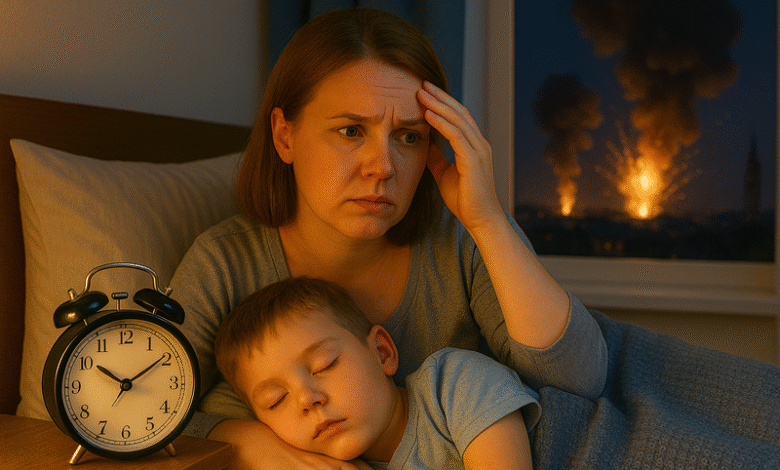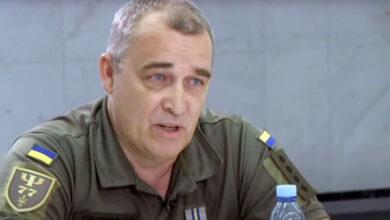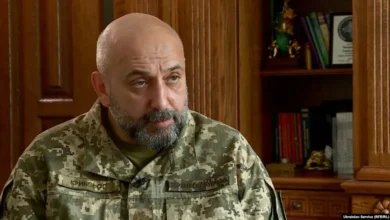Lack of sleep in wartime: a sleep specialist spoke about the consequences and gave advice

The war changed the life structure of Ukrainians both through danger, destruction and forced resettlement, as well as undermining basic physiological needs. One of the most painful topics for millions of Ukrainians is chronic lack of sleep. The enemy purposefully chooses the night time for massive attacks, and this deprives the opportunity to restore strength and disrupts normal biorhythms. Many Ukrainians in the front-line territories hardly sleep at night due to explosions and sirens, and in the morning they are forced to go to work without any rest. About how to survive in these conditions without breaking down, and whether it is possible to compensate for sleepless nights, told doctor-somnologist Anastasia Shkodina.
Anastasia Shkodina emphasizes that it is impossible to completely compensate for a chronic lack of sleep. It is only possible to partially restore the body’s functionality to a satisfactory level, but only temporarily. In today’s conditions, you need to be prepared for the fact that every night can turn out to be disturbing, so it is important to have a well-thought-out plan of action in case of an air alarm. A person should clearly know in which cases he is heading to the corridor, and in which cases to the shelter. This is a matter of basic adaptation to new living conditions.
In such situations, according to her, one has to balance between two negative options: fragmented sleep or its complete absence. In Kyiv, for example, some people are able to stay in the subway, where they sometimes manage to get some sleep. If there is a chance to sleep in a shelter, it is worth preparing a “sleep kit” in advance: an eye mask, earplugs, a favorite pillow, a soothing book. A kind of personal anxiety backpack that helps you get through the night.
The somnologist emphasizes that waking up from a siren or explosions is a great stress, and it is very difficult to fall asleep after that. It is important to study one’s own reactions to anxiety: some people become numb and others hyper-anxious. You should work with these reactions and use psychological self-help tools. However, the techniques should be individual – not everyone is suitable, for example, “square” breathing. Whether a person is experiencing a rapid heartbeat, muscle tension, or heavy thoughts, there are techniques for each of these conditions that can be applied right now, without preparation.
In cases where there is still time to sleep after anxiety, she advises to study yourself – whether this is realistic for a particular person. A certain ritual can help: washing with warm and then cold water, lying under a warm blanket, warming up and then throwing it off. Such a temperature effect promotes relaxation. A warm decaffeinated drink or even just warm water before bed can also help.
Shkodina notes that after stress, obsessive thoughts often appear, even if the anxiety has already ended. A person returns home, but cannot sleep because of inner restlessness. In such cases, in her opinion, it is advisable to use special exercises that help turn off thoughts and adjust to sleep. If anxiety occurs in the morning and you go to bed already late, you should direct your efforts to at least start the day. The most important thing is to ensure maximum bright light in the first half of the day. Natural light or artificial, but bright, gives the body a signal that the day has come. Even half an hour on the balcony, in the sun, with a book is a simple but effective way to activate the brain and body.
The day after a sleepless night, a somnologist advises to be kind to yourself. Take breaks every one and a half to two hours, at least for two to five minutes. Do not demand the maximum from yourself. And here a broader question arises – about the culture of interaction at work. If, after a sleepless night, the manager expects the usual productivity from the employee, then the probability that the person will be capable of this is extremely small. This creates the risk of mistakes, economic losses and the accumulation of stress, which can eventually develop into diseases. Such a context requires humanity and flexibility from employers, especially in extraordinary circumstances.
The doctor pays attention to another aspect – nutrition. Due to lack of sleep, the level of the hormone ghrelin increases, which provokes an increased appetite. In such situations, it is easy to succumb to the temptation of fast carbohydrates or heavy food, which create the illusion of short-term vivacity. However, in the future, this only deepens the fatigue. It is important to be aware of this risk and not fall into the trap of food impulses.
As for daytime naps, this is a global problem — because most companies do not have a practice that allows employees to rest during the day. However, a short daytime nap can actually reduce the risk of making mistakes and increase concentration. Napping has its biological consequences: it can make it harder to fall asleep the next night, especially if you sleep after 3:00 p.m. Therefore, he advises to sleep no later than two or three o’clock in the afternoon. If a person slept less than seven hours, then a short sleep lasting 10-30 minutes in the superficial phase of sleep can partially restore strength. If the night’s sleep was shorter than four hours, this is already almost complete deprivation. In this case, it is advisable to sleep for at least an hour and a half.
At the same time, in her opinion, it is important to understand one’s own time to fall asleep – for someone it is ten minutes, for someone thirty. This is also a matter of self-observation and understanding one’s own characteristics. The recommended duration of sleep for an adult is 7–9 hours. However, even before the full-scale war, most Ukrainians slept 5.5–6 hours and considered it the norm. In fact, people who need less than seven or more than nine hours are units. Therefore, for someone, a seven-hour sleep will be full, and someone needs eight hours. This can only be established by self-observation under favorable conditions.
Anastasia Shkodina notes that chronic lack of sleep poses a serious threat to the human body, since sleep is involved in the regulation of almost all body systems. It is as basic a need as water, food or oxygen. Sleep consists of different phases, each of which performs a separate function: during the REM phase (rapid sleep phase), emotional processing of information and the formation of long-term memory takes place, while the NREM phase is responsible for metabolism and regulation of the immune system. It is because of this that it is possible to single out the consequences of chronic sleep loss.
The somnologist suggests dividing these consequences into short-term and long-term. Among the short-term are what is familiar to everyone who has not slept at least once: drowsiness, fatigue, decreased concentration, episodes of microsleep, when a person “falls out” of reality for a few seconds. She pays attention to typical complaints: memory difficulties, when a person not only cannot concentrate, but is unable to recall the necessary information at all. This is accompanied by weakness, muscle fatigue, body aches – a condition well known to anyone who has not slept well.
As Shkodina emphasizes, in the long run the consequences of lack of sleep are even more serious. She points to scientific evidence linking sleep disturbances to an increased risk of cardiovascular disease, from hypertension to heart attacks and strokes. She also mentions endocrine disorders—obesity, diabetes, and obesity, which can cause apnea—a separate disorder that further worsens sleep quality, starting a cyclical process that is hard to get out of.
Among other long-term consequences, the doctor highlights neurodegenerative diseases and an increased risk of dementia. According to her, the human brain has a glymphatic system that works mainly at night and is responsible for cleaning the nervous system. If this system does not function properly, toxic substances accumulate in the brain, which increases the likelihood of developing Alzheimer’s disease. She notes that now inefficient work of the glymphatic system is considered one of the key factors in the occurrence of dementia. If Ukrainians are globally sleep deprived for the fourth year already, then all of the above is what can await us in the near future. However, the consequences of lack of sleep will manifest themselves not tomorrow and not in a year, but in ten to twenty years, when it will be too late to ask the question: what to do about it?
Separately, it emphasizes the risk to the immune system and increased vulnerability to infections. It also points to a link between lack of sleep and mental health—increased risk of anxiety and depressive disorders, as well as stress-related disorders. After all, sleep is a key element of emotional regulation. Shkodina also draws attention to the socio-economic aspect of the problem. If people lack quality sleep, it affects social interaction: irritability increases, communication efficiency decreases, and productivity deteriorates. It also highlights the link between sleep deprivation and increased risk of traffic accidents, as well as overall mortality from acute physical and mental disorders. This is not only a medical, but also an economic problem of a national scale, which is still not receiving adequate attention.
In the context of helping people who find it difficult to fall asleep in extreme conditions, the somnologist asks the counter question: what exactly prevents falling asleep? If noise is the problem, she suggests using earplugs, white noise, or binaural beats in headphones. If intrusive anxious thoughts are bothering you, it’s a matter of working with them. If there is muscle tension or physiological manifestations of anxiety – palpitations, for example – relaxation techniques should be used. Each case is individual and universal, so general advice can be harmful. For example, when a person uses a breathing technique, and instead of being calm, he feels dizzy or has a headache. This creates additional stress, and instead of the problem of sleeping in a shelter, a person also gets the problem that “something is wrong with him”, and therefore – new anxiety. Even such popular advice as listening to the sound of rain may not be for everyone: for some, the sound of water evokes unpleasant memories. That is why help should be selected individually – depending on the person’s condition.
Shkodina points out that if a person cannot sleep only in a shelter, it is necessary to find out what exactly prevents it and eliminate this obstacle. But if she can’t sleep anywhere, this is already, in her opinion, a sign of a chronic sleep disorder that needs treatment. In Ukraine, there is still no official specialization “somnologist” or “somnotherapist”, and these are specialists who have received training mainly abroad, create public organizations, teach others, but work mainly on a volunteer basis. She clarifies that there are currently more than 80 types of sleep disorders, and each of them requires a separate approach. According to her, about 70% of them can be treated without medication, as pharmacological methods have limitations — in particular, not all drugs are registered in Ukraine, and they also have side effects, the risk of addiction and tolerance.
The doctor refers to the third edition of the International Classification of Sleep Disorders, according to which most diagnostic criteria are based on symptoms lasting more than three months. According to her, some experts believe that even a month is enough to make a diagnosis. If the problem lasts a month or two, there is still a chance to overcome it yourself, but if it has been more than three months and self-help methods do not work, you should definitely contact a specialist. After all, usually sleep disorders are complicated by psychological problems, and then it is already difficult to understand: a person does not sleep because he has anxiety, or anxiety arises as a result of insomnia.
She notes that the issue of daytime sleep — naps — is of social importance and deserves a broader discussion. For example, the Kyiv Institute of Economics created special sleep capsules for students. And although it seems logical, there is no complete picture to make a systemic decision — because there are no large-scale studies of the state of sleep of the population of Ukraine, the spectrum of disorders and corresponding approaches.
Before scaling local initiatives, it is necessary to evaluate their effectiveness. According to the somnologist, the question “whether it is necessary to create conditions for daytime sleep in universities or offices” is not only about medicine, but also about economic feasibility and social culture. All such decisions – whether to create rest rooms, or to change the work schedule, or to extend the lunch break – most often depend not on the state, but on the management of the institution. The state can only initiate research, train specialists, formulate recommendations, but not force anyone to follow them.
In this context, Shkodina mentions the reaction of clients to advice on sleep hygiene. She often has to hear skepticism: “What is the silence? What is the regularity? We live in a war.” She notes that people often do not even try to implement simple principles of sleep hygiene, although they are the starting point for stabilizing the regime. It is about maintaining a constant time of falling asleep and waking up within an hour or two, about creating a favorable environment: darkness, silence, comfortable temperature, humidification of the air.
The doctor points out that not only nighttime behavior plays an important role, but also daytime behavior. For example, it is difficult to expect a person to fall asleep without difficulty if he drank ten cups of coffee during the day. These are basic things that are often joked about, but they are the basis. She gives an example when she advised a friend to give up the phone at least 30-60 minutes before bedtime, to which she received an ironic answer: “What am I going to do during this time? Look at the ceiling?”. It is this period that should be filled with evening rituals – a hot bath, a quiet book, self-care. This is the first step that should be taken whenever possible.
Regarding falling asleep in front of the TV or laptop, Shkodina expresses an unequivocal position: this is not the norm. She explains that most people fall asleep watching TV not because it’s so convenient, but because they can’t fall asleep otherwise. In such cases, it is necessary to understand why the body knows how to sleep, and a person cannot fall asleep on his own. If there is a regular problem, then this is an indicator of the presence of a disorder that needs to be worked on. If falling asleep is caused by overwork, this is evidence of a chronic lack of sleep.
According to the doctor, most people do not set a timer, so the TV is on all night, creating a sound stimulus that disrupts the structure of sleep. Combined with the hyperselectivity of the nervous system—a common occurrence during wartime—even minor stimuli can cause awakenings, light sleep, and constant tension. At the same time, routine problems – family, household, work – also do not disappear anywhere and accumulate.
Regarding night awakenings, the somnologist emphasizes: one or two per night is the norm. The problem is the inability to fall asleep after waking up. If this situation is repeated regularly, it can be associated with both medical and psychological disorders. You should not look at the clock, because after that a person begins to worry that there is little time left, that he will not have time to sleep, that tomorrow will be a disaster. Such thoughts only worsen the situation. You also shouldn’t force yourself to sleep, because sleep isn’t something you can tell your brain to do. The stronger the desire to fall asleep, the less likely it is to actually fall asleep.
When asked whether it is worth getting up at night and doing things, she says that it is a controversial moment. Cognitive behavioral therapy does recommend getting out of bed, doing something boring for 20-30 minutes, and only then returning to trying to fall asleep. However, Shkodina herself is inclined to a different approach — to stay in bed and consciously allow herself to rest. After all, even if a person does not sleep, the body is still in the recovery phase, and not in intense activity. She allows her clients to read in bed, although the classic recommendations indicate that the bed should be associated only with sleep and sexual activity. However, if the book is calm, without a strong emotional load, it can be useful. She also advises to perform relaxation exercises. If you can’t sleep, you should at least rest and not be overly active, because it is activity that reduces the chances of falling asleep.
The somnologist emphasizes that many people do not really understand how much sleep they need and do not know how to monitor their own fatigue signals. She explains: the fact that a person is used to sleeping five hours on weekdays and ten on weekends does not mean that such a regime is natural for him. On the contrary, it is a sign of chronic compensation, when the body accumulates fatigue all week and then tries to “make up” on the weekend, which creates fluctuations in biorhythms, reduces the quality of sleep and worsens well-being. In the conditions of war, the problem of lack of sleep not only does not decrease, but deepens, and requires a specialized response – both at the level of individual self-care and at the level of system solutions.
Shkodina believes that the state should pay attention to the problem of sleep disorders and start comprehensive research: study the state of the population, which types of disorders dominate, how willing people are to seek help, and who exactly should provide it. In Ukraine, there is still no state standard for a specialist in sleep medicine, and therefore, there are no algorithms and protocols established in the health care system. This creates a systemic gap that results in invisible but massive consequences—reduced work capacity, emotional instability, and increased risk of disease.
Shkodina concludes that even in the current conditions it is possible and necessary to start small. It may not always be possible to fall asleep in conditions of anxiety or shelter, but every time it is possible, it is worth creating a falling asleep ritual for yourself, protecting yourself from information overload for an hour or two before bed, maintaining a comfortable temperature in the room, and lowering the light level. Even the simple habit of going to bed and getting up at roughly the same time gradually forms a stable circadian rhythm and improves sleep quality. Sleep is the most natural ability of our body. If we cannot sleep, this is already a signal that the body or psyche does not have the conditions for this. And everyone’s task is to find ways to restore this ability, while there are still resources and time.





